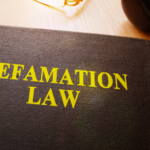What is the Legal Defence of Honest Opinion in Defamation Cases?

Federal Defence Minister Peter Dutton has been awarded $35,000 in damages after winning his defamation lawsuit against refugee advocate Shane Bazzi.
The former Minister for Home Affairs commenced legal proceedings against Mr Bazzi in the Federal Court of Australia over a tweet posted to social media on 25 February 2021.
The lawsuit sought damages for defamation, as well as ‘aggravated damages’ for the “extravagant language’” used.
The tweet, by Mr Bazzi said: “Peter Dutton is a rape apologist.”
Defamatory tweet
The tweet was referred to Mr Dutton’s comments about Brittany Higgin’s allegation of being sexually assaulted in Parliament House. Mr Dutton said that he was not aware of the “she said, he said” details of the allegation.
The tweet was linked to an article in the Guardian Australia which reported comments made by Mr Dutton in 2019 that some women on Nauru “have claimed that they’ve been raped and came to Australia to seek an abortion”.
At the time, comments Mr Dutton suggested the alleged victims were “trying it on” to secure a medical transfer to Australia.
Mr Dutton’s lawyers submitted to the court that Mr Bazzi’s tweet defamed him by wrongly suggesting he condoned and excused rape.
They told the court their client was “deeply offended” by the tweet.
“Obviously as minister for immigration or home affairs, it’s a rough-and-tumble business and there are lots of advocates and a lot of passion in the space where people make comments which are false and untrue, offensive, profane,” Mr Dutton said in an affidavit.
“This went beyond that, and it went against who I am, my beliefs.”
Honest opinion
Mr Bazzi sought to rely on the legal defences of honest opinion and fair comment on a matter of public interest.
Defences rejected
But Justice Richard White rejected both defences, finding that Mr Bazzi had not established the statutory defence of honest opinion or the common law defence of fair comment on a matter of public interest.
His Honour accepted that Mr Dutton was offended and distressed by the tweet, but the politician was not entitled to aggravated damages because there was “no suggestion” he had been affected “in his day-to-day political or ministerial activities, or in his relationships with other people”.
“Mr Bazzi’s description of Mr Dutton as a person who excuses rape was no doubt a serious defamation, particularly having regard to the Ministerial office held by Mr Dutton at the time,” Justice White remarked, adding:
“It is understandable that, despite Mr Dutton being accustomed to bearing ‘the slings and arrows’ which are an incident of high political office, he found this statement of Mr Bazzi offensive and hurtful.”
“However, a sense of perspective does have to be brought to the assessment of the seriousness of the defamation. It was not published in any mainstream media and was published to a relatively small number of people only.”
Mr Bazzi removed the tweet shortly after he received a letter from Mr Dutton.
Possible appeal
He says he is ‘disappointed’ with the outcome of the cases, but proud that he had stood by his principles.
He is currently considering an appeal to the full court.
The case is due back in court in December 2021 when Justice White will determine costs.
The defence of honest opinion
The defence of honest opinion is contained in section 31 of the Defamation Act 2005, which provides that:
- It is a defence to the publication of defamatory matter if the defendant proves that:
(a) the matter was an expression of opinion of the defendant rather than a statement of fact; and
(b) the opinion related to a matter of public interest; and
(c) the opinion is based on proper material.
- It is a defence to the publication of defamatory matter if the defendant proves that:
- the matter was an expression of opinion of an employee or agent of the defendant rather than a statement of fact; and
- the opinion related to a matter of public interest; and
- the opinion is based on proper material.
- It is a defence to the publication of defamatory matter if the defendant proves that:
(a) the matter was an expression of opinion of a person (the commentator ), other than the defendant or an employee or agent of the defendant, rather than a statement of fact; and
(b) the opinion related to a matter of public interest; and
(c) the opinion is based on proper material.
(4) A defence established under this section is defeated if, and only if, the plaintiff proves that:
(a) in the case of a defence under subsection (1)—the opinion was not honestly held by the defendant at the time the defamatory matter was published; or
(b) in the case of a defence under subsection (2)—the defendant did not believe that the opinion was honestly held by the employee or agent at the time the defamatory matter was published; or
(c) in the case of a defence under subsection (3)—the defendant had reasonable grounds to believe that the opinion was not honestly held by the commentator at the time the defamatory matter was published.
(5) For the purposes of this section, an opinion is based on proper material if:
(a) the material on which it is based is:
(i) set out in specific or general terms in the published matter; or
(ii) notorious; or
(iii) accessible from a reference, link or other access point included in the matter (for example, a hyperlink on a webpage); or
(iv) otherwise apparent from the context in which the matter is published; and
(b) the material:
(i) is substantially true; or
(ii) was published on an occasion of absolute or qualified privilege (whether under this Act or at general law); or
(iii) was published on an occasion that attracted the protection of a defence under this section or section 28 or 29.
(6) An opinion does not cease to be based on proper material only because some of the material on which it is based is not proper material if the opinion might reasonably be based on such of the material as is proper material.








